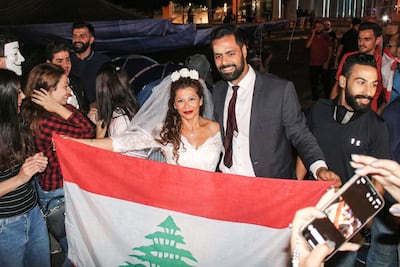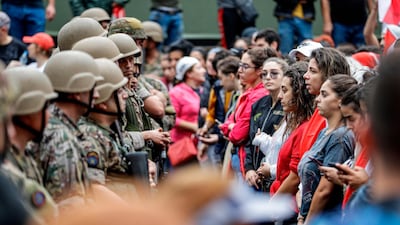Blaring vuvuzelas and banging drums, protesters chanted "revolution" as they blocked the road in the upmarket Ashrafieh area of Beirut yesterday to discourage people from going to work as Lebanon began its seventh day of protests.
"Revolution against harassment; revolution against rape," chanted one of their leaders, Dayna Ash, 30. That morning, when she arrived with a handful of other women, a group of men had just been broken up by soldiers for trying to protest.
"I showed the military I knew my rights and that the law says we have every right to sit on the ground to protest," she told The National.
The soldiers gave in to the women but kept a watchful eye on them as they were joined later by more men and women protesters.
"They knew that we are very powerful women. It really matters how you talk to them," observed film producer Liliane Rahal, 38.
From Tyre in the south to Tripoli in the north, the protests that have gripped Lebanon since last Thursday have attracted high numbers of women who have come to embody what many have called the country's first cross-community uprising since the civil war ended in 1990.
Alia Ibrahim, co-founder of Lebanese news site Daraj, told The National that for the first time in recent history, women are voicing their concerns as women and not as members of a sect. Defying traditional religious and political divisions, Lebanese people of all classes have joined the protests, taking the ruling elite by surprise.
“What brought everyone to these demonstrations is the fact that they all want to change the system. Women kept pushing their fights too late because there was always something more important to do, like avoiding a war,” she said. Lebanese women suffer from discriminatory laws when it comes to divorce and harassment.
A picture of a woman kicking an armed man in the groin went viral on the first night of the protests in downtown Beirut, shortly before riot police cracked down on demonstrators.
Malak Alaywe Herz, whose karate kick has been turned into cartoons and sketches, celebrated her wedding in Riad Al Solh square on Wednesday night, dancing the traditional Lebanese debke among thousands of protestors in a white wedding dress.

In an effort to keep protests peaceful after violence flared up Friday night, a group of women dubbed "the frontline women" decided to band together, holding hands and circling protectively around other women.
Ms Ash was one of them. “It started with 20, then became 300 [women]. It’s not that we thought that because we were women, we would not be beaten up. It’s because we chose a peaceful revolution,” she said.
In Tripoli, women came to protests with their husbands and children on Tuesday night, sometimes pushing babies in prams through the crowd.
“When people see women on the ground, they feel more secure that they can come,” said Maya Fawad, 35.
Standing in Tripoli's Al Nour Square, a dozen women and young girls chanted a popular protest slogan: "All of them means all of them" – a reference to the hoped-for resignation of Lebanese politicians.
"Unfortunately, you do not see this in Tripoli, but we are equal to men. Women are half of society," Mrs Fawad said. A male relative, who asked to remain anonymous, cheered the women on.
“Usually it’s taboo for ladies and children to be in the streets, but my mother came, and everybody came,” he said.
Older women participated in protests with their friends, waving small Lebanese flags. "I have a slipped disc but came anyway. We are really fed up with our politicians. Our children need a wasta [bribe] to find a job after university," said Zeina Maassoud Mekki, a mother of two.
The strong presence of women in Tripoli is symbolic, Ms Ibrahim said. "Women are leading in a space that is linked in everybody's mind to the emergence of Islamic fundamentalism in the city," she said, referring to Al Nour Square.
In the southern city of Tyre, a video of an actress, Sally Basma, went viral on Lebanese social media after she was beaten up, along with other protesters, on Saturday by armed thugs who were offended by insults against a veteran politician. Ms Basma has returned to the protests.
The entire ruling elite has been criticised since the beginning of the protests. "Even if it takes years, we will stay in the streets until we get our rights," she said.

